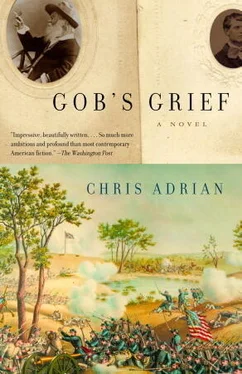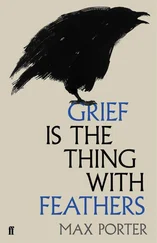Walt said, “I think it will be glorious.” Dr. Fie smiled, and then he leaned close to Walt’s face.
“I’m sure you do. I’m sure you can see it in all its glory. You are so precious and able, Mr. Whitman. You with your swaggering walk and your great soul and your distinctive absence of necktie. But I know you, sir. I know you well, and you are not very much at all. You think you are special, and yet really you are not. Really, sir, you are nobody at all. Really you are the least important person in all the world.” Dr. Fie went away, then, not elaborating on his attack, or explaining it. Instead he took Pickie into his big arms and walked back to the crowd. Walt hung on the rail and looked down at the rushing water. Usually he was sensitive to cruel words, but it meant nothing to him, today, to be attacked by a stranger.
Canning Woodhull died two weeks after his son’s wedding. Walt went up to see him buried at Greenwood Cemetery, though he had planned not to return to New York for a long time. He’d encouraged his mother to move to Camden with George, so he could visit her but not have to look at all the places in Brooklyn and Manhattan — every last place, everywhere, it seemed — where he and Gob had wandered.
It was a pretty, white funeral, filled with joyous songs — a Spiritualist funeral. Mrs. Woodhull and Tennie and Maci Trufant and all the Claflin ladies wore matching white dresses of white silk, with lace at their throats, and white skirts that became stained green at the hems by cemetery grass. Gob and Dr. Fie wore white suits, with white silk ties and diamond stickpins. Pickie Beecher was dressed to match them precisely, except he had a ruby pin in his small tie, that glinted there like a spot of fresh wet blood.
The joyous white mourners were gathered next to a coffin draped like an Easter altar with white linen and lilies. It was lowered down into the ground while everybody sang a very happy song. Mrs. Woodhull herself officiated — Mr. Beecher was nowhere to be seen. She spoke elegantly and harshly for the dead man, saying her husband was a genius, selfish and inconsolable in his need for drink, and that death had translated him into a happy spirit who worked with all the other spirits to hurry the day when Earth and Heaven would be married into a single perfect place. Walt stood with his arm around Gob, who’d sidled up to him as his mother spoke, and listened. Walt was dressed in a respectable black suit, and felt he must look like a penguin in a wilderness of ice.
Gob stayed on after his mother and her family had left. Even after the new Mrs. Woodhull went wandering off among the tombstones with Dr. Fie, he stayed, looking down into the grave. Because Gob had asked him to, Walt stayed with him. Gob began to cry. Not, Walt was sure, because he loved his father, but simply because he loved all the dead. Walt gave him a long squeeze and sang a song for him, one as joyous as those sung by the white mourners. He leaned over, singing loud and sweet into the grave:
“My days are swiftly gliding by, and I a pilgrim stranger,
Would not detain them as they fly, those hours of toil and danger;
For O we stand, on Jordan’s strand, our friends are passing over.”
At the end of June, Walt took a trip to New England, to read a poem at Dartmouth College for its commencement. It was a pleasant journey, but it did nothing to distract him from his unhappiness. Maci Trufant came from this country.
He did not wish to hate her. He was not jealous, no matter what Hank said. He felt sad, and he felt a fool, and his stomach hurt when he thought of them together, so close and so happy. A person could not have two Camerados — such intimacies of the soul could only be shared with one other — and Gob had chosen the girl to be his. Does the tide hurry, seeking something, and never give up? O I the same , Hank said. But Walt did intend to give up. He was steaming down the Hudson on the Fourth of July, dozing as the boat passed through a series of thunderstorms punctuated by bright skies, when he made his decision. As he slept, he dreamed he was a little spider, throwing out silk from his belly, delicate tendrils that drifted into a void in search of a nonexistent other. When he woke he took out his latest daybook from his pocket and made an entry: To GIVE UP ABSOLUTELY and for good, from this present hour, this FEVERISH, FLUCTUATING, useless undignified pursuit of GW — too long (much too long) persevered in, so humiliating. It must come at last and had better come now — LET THERE FROM THIS HOUR BE NO FALTERING at all henceforth (NOT ONCE, under any circumstances) — avoid seeing him — OR ANY MEETING WHATEVER, FROM THIS HOUR FORTH, FOR LIFE.
Oh Walt , said Hank. You can’t mean it.
Walt and Gob wrote letters back and forth, through the rest of the summer and the fall of 1872. Work keeps me here , Walt wrote. And Mother has gone to Camden, so now really I have little reason to return to Brooklyn. And I am very sorry for your mother’s declining fortunes. I think it was a mistake for her to clobber Mr. Beecher — he and his friends will clobber her back hard and long. Mrs. Woodhull ‘s fortunes had indeed taken a precipitous dive after seeming to peak in May, when she gathered a faction of Woman’s Righters to herself and formed the People’s Party, who nominated her as their candidate for President, with Frederick Douglass as her unwitting running mate. After her nomination, people began most vigorously to persecute her for her beliefs. She was turned out of her fancy house, and business dried up at her brokerage. Beecher was her enemy again. Indeed, she perceived him and his sisters Catharine and Harriet to be the chief architects of her misery. She retaliated by publishing an account of Henry Beecher’s affair with one of his parishioners, the wife of Theodore Tilton. Mr. Beecher practiced as Mrs. Woodhull preached — why was he not denigrated as she was? A man named Comstock had her and Tennie and Colonel Blood arrested for sending obscene materials through the mail. They spent election day in jail, and remained there intermittently, from October on.
I miss you, Walt , Gob wrote. But his life seemed to be proceeding very smoothly and happily without Walt in it. His work went very well— You should see how our little friend has grown , Gob wrote, meaning his engine. He reported that his wife got more beautiful every day, and every time he put pen to paper the weather in New York was balmy or crisp or the beautiful snow was falling like a blessing. (In Washington, meanwhile, it was sweltering or bitter stinging cold or ice fell from the sky and slew horses by the dozen.) Little Pickie was contented and fat, but he missed his Uncle Walt.
A very happy family, the three of you , Walt wrote. How nice for you, my boy.
Eventually, Walt stopped answering letters. For a while he sent only tiny notes. So busy! Will write soon! Once, in a little fit of loneliness and spite, he sent just an empty envelope, and then he sent nothing. Gob’s letters he placed unopened in a cigar box, which he hid in his wardrobe. Hank scolded him endlessly, becoming increasingly shrill— You are a kosmos. He is a builder. You must be together. You must help him. How can we come back if you don’t help him? Walt ignored him, or scolded back, and at last drove Hank to silence. Then his winter was truly silent and dark and lonely. Walt trudged back and forth to work, looking like an old man again with his beard and hair grown long, and now walking like an old man, too. He slept more and more, though he wished not to, because Hank and Gob waited in his dreams to plead with him.
“You are not he,” Walt would say to them both. He dreamed of the reviewing stand in winter, without Mr. Lincoln and without the parade. Only the sign remained, but now it spelled How are you, Walt? Hank and Gob were with him on the stand. “You are not the Camerado, and you are not the Camerado,” Walt said. Because they were not. One had abandoned him for death, the other for marriage, and neither, he understood finally, had reciprocated his affection and his friendship — their love was never as pure and strong as his love. In the dream, Hank and Gob would crowd around him, enfolding him in their arms. “We do love you,” they’d say. “Brother, father, son, we love you — you are our love and our hope. Come back to us. Come back to New York.” Then Gob would put his earnest beautiful face in Walt’s and say, “Help me win, Walt, please help me win.” They would squeeze him and squeeze him until he woke, shouting, “I won’t, I won’t! Leave me be!”
Читать дальше












